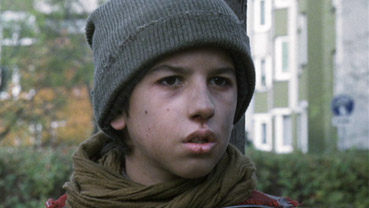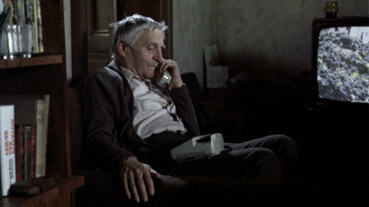|
If
I was drawing up a list of favourite film titles, then
Michael Haneke's 71 Fragments of a Chronology of
Chance would definitely be on it. Guaranteed to
instantly intrigue fans of alternative cinema, it's the
sort of title that seems almost designed to send mainstream addicts scurrying.
It's suggestively art-house, but in its way is as up-front
a description of the film's content as Snakes on
a Plane.
71
Fragments takes a true life incident – a student
who walked into a bank and killed three people and then himself for no
apparent reason – and follows the threads of chance
that brought some of those involved to that location at
that time. At the outset they are unconnected: a young asylum
seeker crosses the border into Austria; a man wakes up and
expresses concern for his baby daughter; one student challenges another
to solve a shape puzzle; an old man cooks
and eats food in his apartment; a couple arrive at a foster agency
with a gift for the girl they hope will come to live with
them; guns are stolen in a break-in at an army barracks.
As with the director's first feature, The
7th Continent, we are only supplied snippets
of information and are invited to fill in the gaps, the film being comprised of sequences
that vary greatly in length, running from a few seconds
to several minutes.

The fragmentary nature of dealing
with several stories in such a way makes it hard to engage
with any of them on a meaningful level. But
then it seems likely that we're not meant to. More than
either of Haneke's previous two features, 71 Fragments
has the feel of a cinematic experiment, a detailed preliminary
sketch for a fully formed work that would later appear as Code Unknown [Code inconnu:
Récit incomplet de divers voyages] (2000),
but a consistently interesting and complex sketch nonetheless.
As with his two previous films, a lot is suggested but little
is shown and the threads unwind in largely economic fashion.
This is most evident in the story of the young asylum seeker,
whose entire journey from initial border crossing to new
family is told as a series of short sequences establishing
only his present status quo, the decisions and actions that
brought him to that point remaining largely unseen.
The
route to the final scene in the bank, foretold by an opening
title card and the storyline that puts a gun in the hands
of a volatile student, is used by Haneke to observe certain
aspects of human behaviour, whether it be loneliness, selfishness,
or even obsessive drive. The last of these is very effectively
realised in a static, three minute shot of a table tennis
player giving his all against a ball serving machine. It
tells you a lot about determination and commitment to his
sport, but little about the person beneath, unless you accept
the notion that a person is what he does, which I do not.
It has been suggested elsewhere that Haneke's purpose is
to examine lives that are somehow empty and pointless, but
to do so based only on a number of small observations of
limited activity would be superficial at best and would
assume an arrogance on the director's part that I would
hesitate to accuse him of.
Certainly
the point Haneke is making here is more opaque than usual,
and for my money less fully realised, especially compared
to the similarly structured Code Unknown,
where characters are more richly defined and the individual
stories have clear purpose and more depth. Both films are
intrigued by the notion and consequences of chance, but
71 Fragments lacks Code Unknown's
almost epic sense of cause and effect, where litter thoughtlessly
discarded by one character ultimately leads to the deportation
of another.

As
with the director's previous two films, news broadcasts make a regular
appearance and consist largely of trivia or stories of war
or conflict. This appears to have more to do with Haneke's
belief that for many reality is experienced only through
the media than the various story threads the material is intercut
with, although later a TV article becomes the catalyst for
the combination of two seemingly disparate stories, three
if you see the news reports as one of them. Haneke
suggests that our failure to really communicate with each
other is central to the film, and this is sometimes very
effectively realised, such as when a cashier is distracted by the sight
of a security guard who crosses himself while on the phone
and is a little brusque with an elderly customer who turns
out to be her father, momentarily linking two of the threads
via a third party. (The father later bends his daughter's
ear in a phone call that lasts nine screen minutes, a shot
that you can't help suspecting Haneke used to test how long
he could hold on a single, static shot without losing the
audience.)
But
fragments they remain, little moments from small narratives
that may or may not be destined to end when the characters
arrive at the wrong place at the wrong time. It's still
an intermittently fascinating film, but lacks the cohesiveness
and clear sense of purpose that made 7th Continent
and Benny's Video
so riveting and unsettling.
As
with the previous two films in this set, the 1.78:1 anamorphic
transfer here has good contrast and colour and a decent
level of detail, though is just shy of what I'd describe
as sharp. Only in a couple of low contrast darker scenes
do any real problems appear in the shape of rampant grain
and the associated compression artefacts.
The
Dolby mono 2.0 track is clean and with a very reasonable
dynamic range. Haneke rarely uses non-diegetic music, but
dialogue and sound effects are well reproduced.
The
expected Michael Haneke Interview (23:30) is the longest of the three on this set but the
one that is least focussed on the film in question, with
the director discussing the process of screenwriting and
his love for the editing process, and his strong dislike
for films that "turn evil and violence into consumable
commodities." As ever, it is both informative and engaging.
Most
Michael Haneke films divide opinion, but where the others
prompt argument over their content, here it's the effectiveness
or otherwise of the technique that becomes the focus, some
hailing a plethora of layered detail, others suggesting
that there is actually less here than meets the eye. I find
myself sitting somewhere between the two, admiring the technique,
the small detail and the economy of some of the storytelling,
but still left a slight sense of incompletion.
|